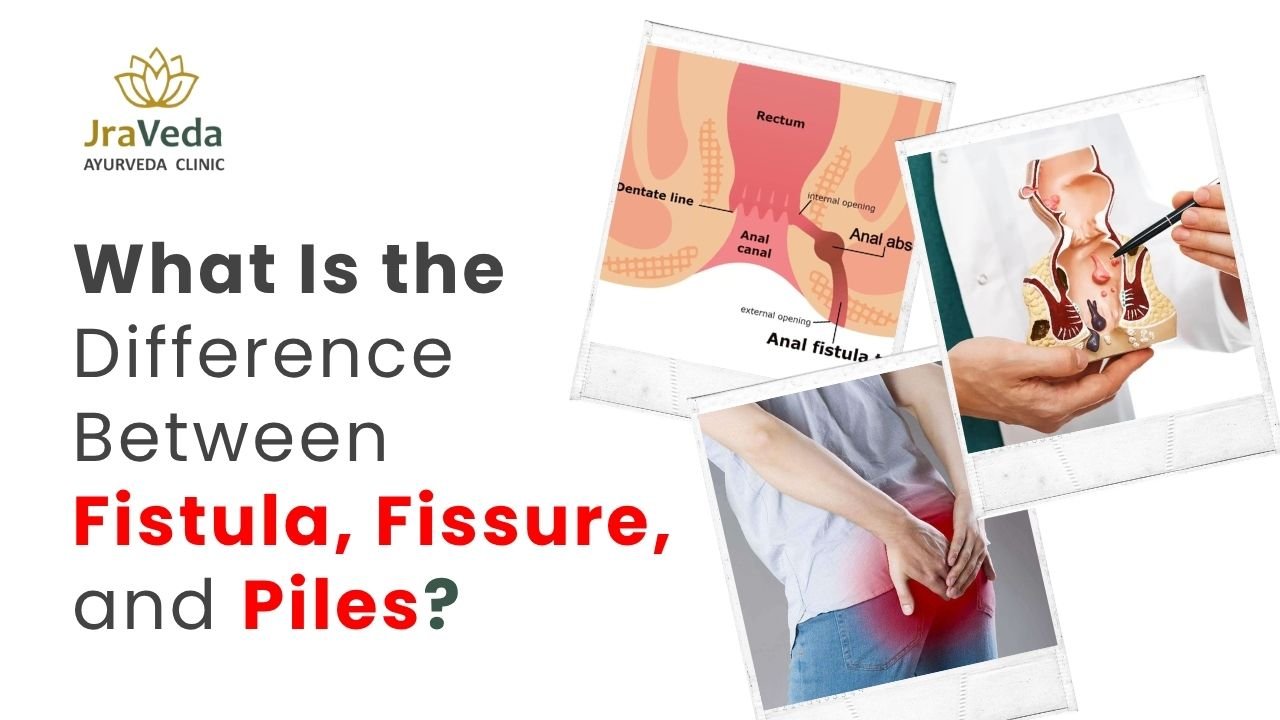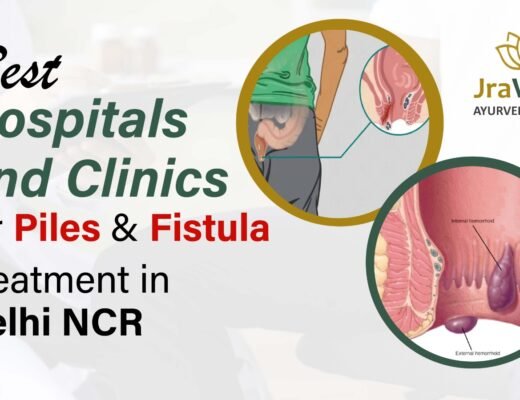Fistula, fissure, and piles are three common anorectal conditions that affect millions of people, yet most individuals struggle to identify the differences between them. These conditions often cause pain, discomfort, bleeding, and embarrassment but with the right knowledge and early diagnosis, they are all treatable.
In this blog, we’ll clearly explain the difference between fistula, fissure, and piles, including their symptoms, causes, and how Ayurvedic treatment at JraVeda Ayurveda Clinic offers long-lasting, non-surgical relief.
What Are Piles (Hemorrhoids)?
Piles, also known as hemorrhoids, are swollen and inflamed veins located in or around the rectum and anus. They can be internal (inside the rectum) or external (outside the anal opening).
Common Symptoms:
- Bleeding during or after bowel movements
- Itching, swelling, or irritation around the anus
- A lump or swelling near the anus
- Pain while sitting or walking
Common Causes:
- Chronic constipation or straining
- Prolonged sitting
- Low fiber diet
- Obesity and pregnancy
- Heavy lifting
Ayurvedic View:
In Ayurveda, piles are referred to as “Arsha”, caused by an imbalance in Vata, Pitta, or Kapha doshas. Ayurvedic treatment focuses on addressing the root cause through herbs, diet, and procedures like Kshar Karma or Kshar Sutra therapy.
What Is an Anal Fissure?
An anal fissure is a small tear or crack in the lining of the anus, usually caused by passing hard or large stools. It leads to sharp pain and minor bleeding during bowel movements.
Common Symptoms:
- Sharp or burning pain while passing stools
- Bright red bleeding
- Visible tear or crack near the anus
- Muscle spasms or discomfort for hours after
Common Causes:
- Constipation and hard stools
- Diarrhea
- Childbirth trauma
- Anal injury or strain
Ayurvedic View:
In Ayurveda, an anal fissure is known as “Parikartika”, caused by excessive heat (Pitta imbalance). The treatment includes herbal ointments, sitz baths, mild laxatives, and in chronic cases, Kshar Sutra application.
What Is a Fistula?
A fistula-in-ano is a small tunnel that forms between the inside of the anal canal and the skin near the anus, typically resulting from an infection or abscess.
Common Symptoms:
- Pus or foul-smelling discharge near the anus
- Pain, swelling, or redness
- Recurrent abscesses
- Fever and fatigue
Common Causes:
- Untreated abscess
- Infections of anal glands
- Conditions like Crohn’s disease or TB
- Poor hygiene
Ayurvedic View:
Ayurveda refers to fistula as “Bhagandara”, one of the most complex anorectal conditions. The most effective Ayurvedic solution is Kshar Sutra therapy, where a medicated thread is inserted into the fistula tract, helping it heal gradually from the inside.
Why Choose Ayurveda Over Surgery?
While modern medicine often recommends surgery, it comes with:
- Painful recovery
- Risk of recurrence
- Hospitalization
- High cost
Ayurveda provides:
- Permanent relief without surgery
- Natural healing using herbs and procedures
- Kshar Sutra therapy backed by research from AIIMS & CCRAS
- Cost-effective and outpatient-based care
JraVeda Ayurveda Clinic – Trusted Care by Dr. Raghubansh Singh
If you’re looking for the Best Fistula doctor in Delhi NCR or Best Piles doctor in Delhi NCR, your search ends at JraVeda Ayurveda Clinic.
Dr. Raghubansh Singh is an experienced Ayurvedic surgeon with over 15 years of practice in treating piles, fissures, and fistula using authentic Kshar Sutra therapy and customized herbal plans.
Why Patients Choose Us:
- Non-surgical & safe techniques
- Fast recovery, no hospital stay
- Government-certified Kshar Sutra expert
- Hundreds of successful cases
- 100% natural treatment
Patient Testimonials
Ramesh K. – Gurgaon
“I was suffering from a painful fistula for years. After two failed surgeries, I tried Kshar Sutra at JraVeda. Within 6 weeks, my fistula healed completely!”
Sneha A. – Delhi
“Dr. Raghubansh is amazing. I had a fissure with constant pain. His Ayurvedic treatment helped me heal without any surgery.”
Prevention Tips
To avoid anorectal conditions like piles, fissure, and fistula, follow these:
- Eat a high-fiber diet (vegetables, fruits, whole grains)
- Drink 2–3 liters of water daily
- Avoid sitting for long hours
- Exercise regularly
- Don’t ignore the urge to pass stool
- Maintain proper hygiene
Conclusion
Understanding the difference between fistula, fissure, and piles is the first step toward proper diagnosis and long-term healing. If you’re tired of recurring symptoms or failed surgeries, Ayurveda offers a gentle and effective solution.
At JraVeda, we treat the root cause using ancient Ayurvedic wisdom and modern diagnostic tools. Whether you’re looking for the Best Piles Treatment in Delhi NCR or a safe cure for fistula, we’re here to help — naturally and permanently.




